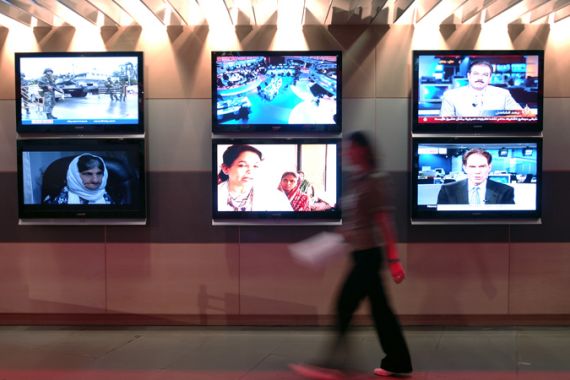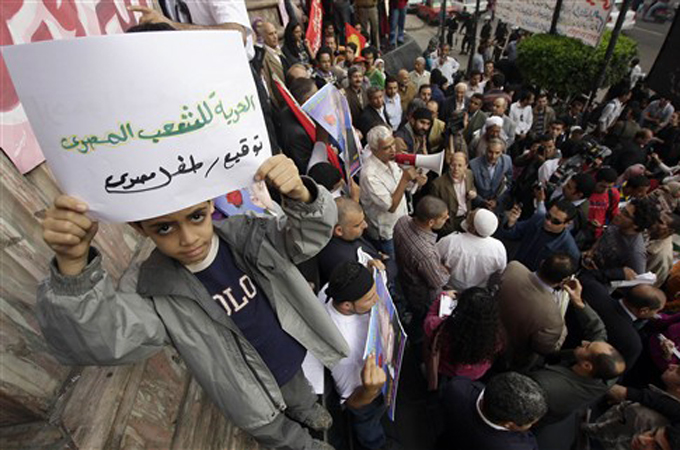Al Jazeera: the Arabs’ vox populi!
The effect of the ‘New Arab media’ on Arab politics has been dramatic, providing new levels of public scrutiny.

 |
| Political scrutiny in the Arab world has undoubtedly increased as a result of the growth in Arab media organisations, issues such as vote rigging in recent Egyptian elections rise to the surface of the Arab public consciousness [AFP] |
Two axioms transcend geography and culture. One, there is no such a thing as a totally free or independent media. Two, all media operate within existing political, cultural and material constraining contexts. This applies to Al Arabiyya, Al Alam or Rotana in the Middle East, as much as it does to Fox, CNN, or the New York Times in the US.
Many Satellite TV channels may be rightly considered an indirect tool of foreign policy. So what? This is hardly a revelation. British, American or Russian broadcasting has been indirectly and in some case directly used as a bargaining tool, supporting a foreign policy vision or preference. This should not be shocking to the sophisticated ‘West’ or cosmopolitan intelligentsia, the media undoubtedly constitutes ‘soft’ or ‘intelligent power’.
Manufacturing Consensus
Noam Chomsky and Edward Herman first put forward the thesis that media is a propaganda tool in the groundbreaking volume Manufacturing Consent: The Political Economy of the Mass Media. The mass media, including cinema, shapes public opinion by feeding the type of propaganda that informs and mis-informs, indoctrinates and de-indoctrinates. In short, it manufactures consensus.
The citizens of the world are drenched in their locale’s propaganda. Whether the locale’s conventional wisdom is liberalism, communism, Nasserism, secular-nationalism or political-Islam the media takes their cues from the transcript in vogue.
When considering Chomsky and Herman’s five filters one realizes that propaganda is inevitable. The two filters of ownership and funding are bound to determine editorial policy, differentiated case by case by various degrees.
This applies to some Arab satellite TV owners as much as it applies to media magnates such Ted Turner and Rupert Murdoch. Murdoch runs a business empire; so do the owners of Al Arabiyya, for instance. Each is enmeshed in the politics, cultures and the contexts in which their media operate. Just as Murdoch might be inclined to favour politics inhospitable to trade unionism, Arab media tycoons may exercise pro-Iraqi, pro-US or pro-Palestinian bias.
Al Jazeera: ‘Intelligent Power’
Where Al Jazeera makes a difference is in relation to the filters of ‘sourcing’ and ‘flak’. With state funding, Al Jazeera, amongst other Arab Satellite channels, has asserted that the ‘subaltern can speak’ to paraphrase Spivak. Why? Sourcing is no longer reliant on the traditional media ‘sisters’ that determine the daily news and headlines. Nor is it enmeshed in ‘clientelistic’ relationship with big business and Western sources of knowledge and power.
News sourcing now derives from the locale and is by locals. It is passionate, sensational, even subjective, but most of all it is powerful. This branding has been very difficult to emulate. The amount of money spent cannot deliver it. For, Al Arabiyya runs a more expensive satellite channel and yet has a much lower share of the Arab viewing publics. The inception of Al Jazeera is a moment akin to breaking the monopoly of the seven petroleum big sisters in the 1960s and 1970s.
The headlines are no longer determined by Reuters or Agence France Presse. Similarly, the news and the world are no longer filtered through the Euro-American mind-set. Al Jazeera has placed a decade of war, violence and counter-violence, terrorism, authoritarianism, dissidence, and brutality in the living rooms of Arab, Middle Eastern and world viewers. It is not then surprising that Al Jazeera’s news bothers many Arab regimes from Morocco to Jordan, as well as Israel and the US.
Thus Al Jazeera is protected from the flak lobbies that have the news scripted, manipulated and manufactured according to interest. Indeed, the source of pressure is different: to measure up to a new standard or moral commitment of indigenous and even a ‘Southern’ take on the news. Especially, where there are causes that must be highlighted.
Al Arabiyya, for instance, tends to exhibit a pro-Saudi and US leaning, and its take on Iraq supports the post-Saddam order. Al Jazeera champions the Palestinian cause and gives space to hearing the marginals of the Arab world: dissidents of all colour. Al Jazeera has done wonders for the Palestinian cause, globalising it more than ever before. It is a feat that decades of Arab public diplomacy has failed to deliver!
With Al-Walid bin Talal preparing to launch a new mega satellite channel, the Arab new media scene is bound to be even more plural, offering wide varieties of opinion. This is a big plus for the emergence of an aware Arab public. Relative to the region, Al Jazeera is positively infectious: other channels and programmes all over the Arab world are seeking to emulate its interactive and inquisitive style. There is a gain for the public, at least in parts of the region.
News is dispersed: Bush, Bin Laden, Clinton, Gaddafi, Peres, Blair, Mandela, Clooney all visited Arab homes and were listened to in their own words. That is more than can be said about much of the Western media.
The Fifth Filter: Post-Modern Arabism
The only filter as far as ideology is concerned that drives Al Jazeera, is ironically the absence of ideology. Radio Cairo, Al-Ahram or ‘Teshrin’ once functioned as the media of official transcripts. Their ‘news’ was filtered through Nasser’s brand of Pan-Arabism or its Ba’thist variant in Syria or Iraq. Al Jazeera has killed this media paradigm. It has taken ‘territory’, big state status, and ideology out of Pan-Arabism.
Al Jazeera, amongst other factors, has heralded an era of what I call ‘post-modern Arabism’. It is non-territorial, polycentric and multi-vocal.
The sound of Saudi Muhammad Abdo, Syrian Drama or Dubai’s Media City widened the Arab canvass of arts and mass culture. In the same fashion, Al Jazeera news anchors and talk-shows such as ‘In the Opposite Direction’ signaled a shift in importance in political status.
Cairo now has to share the status of being the Arab capital of mass culture and media with Doha, Dubai, Beirut, Riyadh and Damacus. A new form of ‘intelligent power’ has for ever re-mapped and re-distributed Pan-Arab roles: wealth, the satellite TV revolution, and new forms of speech.
In this regard, Al Jazeera has been far more effective than the Arab League.
Pan-Arab synergy with Western training and know-how has created a model never before seen in the Arab world. In the past, Arab unity led to dis-unity, and Arab action translated into inaction, and Pan-Arab rivalries have wrecked havoc upon the Pan-Arab body politic.
But only in Al Jazeera – the “box of matches” as President Mubarak humorously quipped when visiting it in 2001- has excellent creativity been ignited for fourteen years. It enlightens the Arab masses through its daring talk-shows: indeed the ‘subaltern Arab’ can now speak!
To talk is both an Arab and Western venerable tradition. That is Al Jazeera’s mission: to parley.
The Media and Foreign Policy
Who forgets Churchill’s amazing BBC speeches, which used to keep the world’s spirits up in the fight against Nazi Germany? Or De Gaulles famous June 18, 1940 BBC broadcast from Britain to resist the Nazis?
What are Voice of America and Radio Free Europe/Radio Liberty if not tools of foreign policy? Radio Free Europe has distributed thousands of free radios this year in a bid to counter Taliban propaganda. Al-Hurra, which is a waste of US taxpayers’ money, was created to further US interests – spreading the ‘gospel’ of freedom and democracy.
The BBC World Service, competent and professional as it may be, serves Britain’s foreign policy and cannot be expected to do that impartially. Had that been the case, the US press, such as New York Times, would have called water-boarding by its name – as torture – between 2002 and 2010. Using the media as tool of foreign policy is an act of sophistication, as evidenced by the democracies of the West.
Al Jazeera and other Arab satellite channels are welcome news. They introduce an element of soft or intelligent power in international affairs. But even ‘soft power’ can sometimes be challenged by ‘hard power’. A pointer to this being the cable alleging George W. Bush wished to bomb Al Jazeera in 2005.
Tony Blair’s lonesome and most memorable service to the Middle East was talking the former US President out of bombing the Qatari channel.
No one knows whether it was by accident or intent when Al Jazeera’s Kabul office was bombed by the US in November 2001 and when cameraman Tarek Ayoub was killed in April 2003 in Baghdad. Maybe one day we’ll all read the account skillfully transcribed by some diplomat.
Al Jazeera and Qatar
Al Jazeera along other sister Arab satellite channels have de-centred the media scene. Al Jazeera, in particular, gives a voice or ‘forum’ to the voiceless, as its own propaganda puts it. Had Arab states opened up their own media, their own dissidents would have addressed their audiences through the local media. Al Jazeera is blameless in this.
Al Jazeera is the gift of Qatar. Qatar invented Al Jazeera into a broadcaster beyond expectations. In return, Al Jazeera reinvented Qatar into an Arab and global heavyweight beyond imagination. For that alone, Al Jazeera is a feather in the Qatari peoples’ cap.
Dr Larbi Sadiki is a Senior Lecturer in Middle East Politics at the University of Exeter, and author of Arab Democratisation: Elections without Democracy (Oxford University Press, 2009) and The Search for Arab Democracy: Discourses and Counter-Discourses (Columbia University Press, 2004), forthcoming Hamas and the Political Process (2011).
The views expressed in this article are the author’s own and do not necessarily reflect Al Jazeera’s editorial policy.
